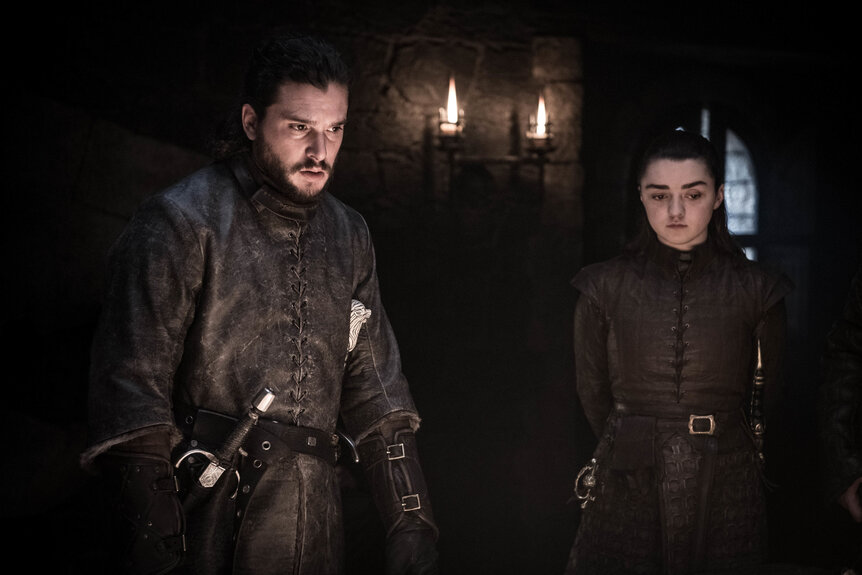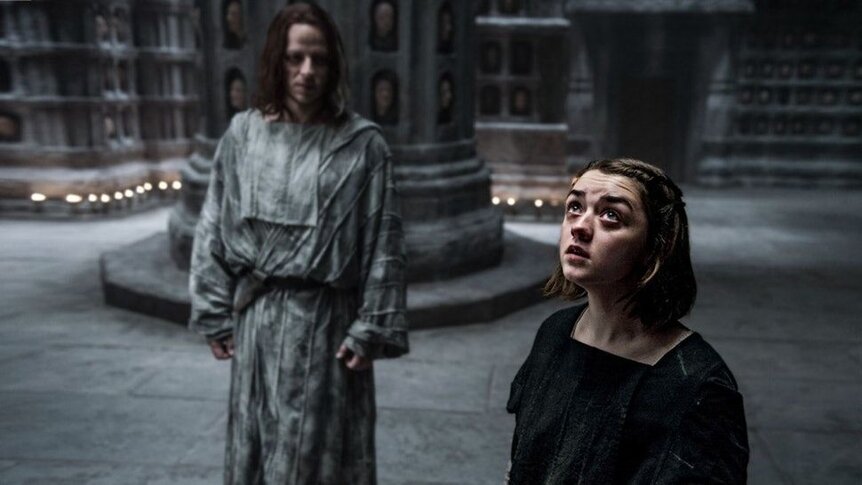Create a free profile to get unlimited access to exclusive videos, sweepstakes, and more!
Arya, Rey, and the long history (and abuse) of the Mary Sue

Game of Thrones’ epic Battle of Winterfell generated plenty of questions, but there was one we never saw coming.
Sure, we’re still wondering what the recently shattered Night King truly hoped to accomplish by marching his army of undead south of the Wall, and we’re most definitely scratching our heads at how fan-favorite characters like Brienne of Tarth, Jaime Lannister, and Grey Worm managed to make it out of the fight alive despite being on the front lines. But the true conundrum the episode posed harks back to an archaic trope better left buried in the crypts of Winterfell: What the hell is a “Mary Sue”?
You’ve undoubtedly heard the label hurled at some of pop culture’s most badass female characters over the years, but while critics (and angry fanboys) have been targeting heroines on TV and film, the term actually has roots in fanfiction. In 1973, Paula Smith published a short, satirical piece of Star Trek fanfic in Menagerie, a Star Trek fanzine. Titled "A Trekkie’s Take," this original work introduced a new character to the series, a 15-year-old half-Vulcan heroine named Lt. Mary Sue. She singlehandedly saved the Enterprise, earned the devotion of both Spock and Captain Kirk, and then tragically died to save the crew.
Lt. Mary Sue is a classic example of the idealized self-insert functionality inherent in fanfiction. Authors create character composites of all the traits they desire and live out their fantasies through them. It’s a way for fans to inject themselves into the narratives of their favorite works, to assume creative control of these universes, and often, to gift themselves the representation they’re not finding in the original art. It’s a literary tool most experienced authors try to avoid, but in the realm of fanfiction, where some of the most popular works are written by young women with no background in traditional forms of composition, it’s a surprising vehicle for self-empowerment. Authors create a Mary Sue to fix what they see wrong with pop culture’s representation of female characters, infusing them with abilities normally reserved for male protagonists, and then transferring a bit of their own conscious to them in order to feel a part of the story.
While the term's fanfiction origins are benign, certain segments of the online community have taken to using it as a perjorative, to indicate a character who doesn't somehow "earn" his or her—let's face it, mostly her—bad-assness through some trial or paying of dues. Like most Internet slang, its use has broadened far outside the boundaries of the original intention.
But when we label female characters on TV and film as “Mary Sues,” we’re not talking about them in their fanfiction sense. We’re not viewing them as empowering-yet-flawed plot devices. We’re insulting them, degrading them, and quietly supporting the idea that women cannot be elevated to the “hero status” that men so often assume. And the perfect, most recent example of this sexist restructuring of the term exists in Arya Stark and her slaying of the Night King in Game of Thrones’ final season.
When the show decided to chuck prophecy and convention out the metaphorical tower by having Arya, not Jon Snow, destroy the series’ most terrifying villain, plenty of fans were up in arms. For every social media post praising the she-wolf’s bravery and unique fighting skills, there were Reddit threads and Twitter rants complaining that Arya hadn’t earned her kill in the same way Jon had. After all, for eight seasons we’ve been led to believe that the King in the North is the chosen one, the hero meant to save the Seven Kingdoms. Jon’s had the most interactions with the Night King, he’s been the one warning us about the potential dangers beyond the wall ever since Season 1, and in the Battle of Winterfell, as he limped along after the blue-eyed monster, it almost seemed like we’d be granted the showdown creators David Benioff and D.B. Weiss have teased for years.But we weren’t, and the plot twist might have been the bravest, most surprising thing the show has ever done.
Despite some fans throwing sexist tantrums about Arya Stark’s hero moment, the character is not, in fact, a "Mary Sue." Revisiting the original fanfic definition, a "Mary Sue" is someone, almost always a female-identifying someone, who possesses traits and abilities that are so unrealistic they’re almost laughable. She’s kind, she’s loved by all, men fall at her feet. She’s also tough, trained in combat, the smartest person in the room, able to excel at anything she does. She has no flaws, but if she does, they only serve to make her more likable, more endearing, or a better heroine.
She is, in a word, perfect.
Arya Stark, as we’ve learned over the course of eight seasons, is anything but. She is not kind; she’s certainly not loved by everyone on the show. She’s tough, sure, but that toughness has been born from years on the run spent hiding from Lannister forces who murdered her entire family. Her skills in combat were honed while training with the Faceless Men, where she went blind, was tasked with poisoning and murdering innocents, and barely escaped with her life after renouncing the assassin order and returning home. Arya Stark has flaws, and the show often reminds us of them. She’s quick-tempered, single-minded in her vengeance, lacks empathy and compassion even where her family is concerned, and enjoys killing because it’s what she’s good at.
How we react to those flaws — whether we praise her as a badass or envy her sword skills — says more about us than it does her “Mary Sue-ness.”
To argue that Arya didn’t earn her defeat of the Night King is to willfully ignore her character arc throughout the series. She’s grown from a scared, helpless waif to an assassin with steely resolve, one willing to sacrifice her life to save her people. She’s reclaimed her identity after spending years trying to shed who she was and where she came from. She’s spilled blood, shed tears, stolen faces to get to that moment in the Godswood — and the shock of discovering it’s her, and not Jon Snow, who’s destined to eliminate the greatest threat to the realm doesn’t diminish or erase all of the hardship she’s endured and hard-won victories she’s had.
But calling her a “Mary Sue” certainly does.It also reveals our own inherent bias against female characters who rise above the station we assign them in these kinds of genre stories. The term “Mary Sue” is not innately sexist — at least, not when we’re describing characters in fanfiction, where the label was born. But it does become sexist when we carelessly attach it to female characters whose accomplishments we deem “unrealistic.” When we claim that Jon Snow — a "Mary Sue" if there ever was one, a man saved time and again by others, brought back to life only to spend his greatest battle stumbling around in the mud and pointlessly screaming at undead dragons — deserved to be the hero, we’re saying Arya Stark doesn’t. And why? Because she’s not strong, capable, selfless, and skilled? Or because she’s a woman and we have a problem with women being heroes?
It’s not just Arya who’s been targeted by fanboys who love to weaponize the term “Mary Sue” without truly understanding its meaning either. Rey’s arc in the Star Wars sequels has earned her the same insult. People were angry that this woman, who spent years fending for herself on a cruel planet, who had to teach herself to fight, to fix, to scavenge in order to survive, was able to fly the Millennium Falcon and harness the Force so readily. She’s suffered, she’s certainly not perfect, and she struggles to use her powers, but we call her a “Mary Sue” anyway. Oddly enough, her mentor, Luke Skywalker, a farm boy who picked up a lightsaber and commanded a rebel fleet with relative ease, was never hampered by the same criticism when the original trilogy premiered.
And being a superhero doesn’t save you from the curse of the “Mary Sue” either, as Captain Marvel can attest. Fans took issue with Brie Larson’s character for many reasons, but one of them was her seemingly unlimited power. Carol Danvers was able to fly, to emit photon blasts from her clenched fists, to overpower alien enemies. She seemed unbeatable and was therefore ripe for the "Mary Sue" critique. But a strong female character is not the sole prerequisite of a "Mary Sue." Captain Marvel is not perfect; she’s a flawed, stubborn, often angry and impulsive woman. She’s arrogant, to a problematic degree, she’s aloof, she’s bitter. Personally, I have no problem with a woman being all of those things, but you can’t create a "Mary Sue" with those personality traits.
Which proves our original point.
When we label women like Arya Stark or Captain Marvel or Rey as “Mary Sues” we’re not invoking the history of the lexicon of the phrase. We’re not constructively criticizing storylines or character arcs. We’re not pushing for better, more accurate representation, more well-rounded heroes. We’re just whining because it’s a woman saving the day instead of a man. We’re complaining because the idea of a female character being capable not only of taking care of herself but of defending the world, of being the only weapon we need in a fight against evil, goes against patriarchal concepts that say women need saving and men are the protectors, that damsels and white knights are real while 100-pound assassins who slay ice zombies and kings who suck at fighting on the battlefield aren’t.
In fanfiction, a "Mary Sue," at best, is a female empowerment fantasy, but calling a female character in film or on TV a "Mary Sue" simply because she’s powerful is the misogynistic reality we’re living in right now. Maybe it’s time we burn, not bury, this outdated label once and for all.
The views and opinions expressed in this article are the author's, and do not necessarily reflect those of SYFY WIRE, SYFY, or NBC Universal.




























